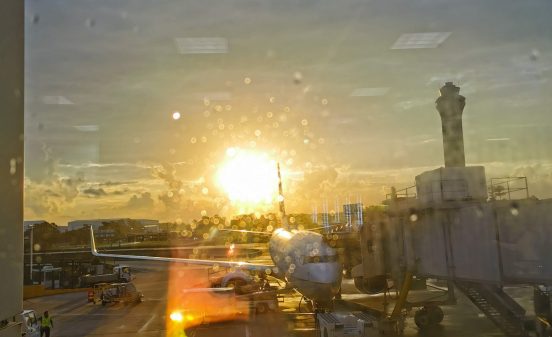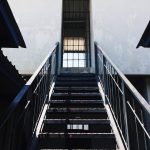The first time that I travelled to Honduras alone was in September of 2019, which, if you didn’t know, is prime hurricane season. I knew that, but United sent me a message saying that Houston would be experiencing heavy rain during my layover, I didn’t think anything of it. Once I got to the Houston airport however, and the rain shifted from a drizzle to the heaviest downpour I had ever seen, I changed my tune.
They called it a tropical depression. The rain was a wall, surrounding the entire airport. You couldn’t see anything past it, but you knew all the havoc it was wreaking from the news reports on your phone. All flights were grounded, nobody coming in and nobody going out. My flight got rescheduled to the next morning, and I knew I would be lucky to get out that early.
I spent a whole day and night in that airport terminal. Surrounded by other stranded passengers, pilots, and airport staff who couldn’t risk trying to get home. We were all stuck in the middle of this storm, forced to watch it roll out, unsure of what would happen next and unable to do anything about it. By the time night fell the rain had quieted down, no longer a deafening roar, but there was still that possibility that it could start up again and drown us all out.
This is what I thought of when I read Guimarães’ description of the Shipibo word jenetian and how this kind of rain can be a metaphor for the situation the Amazonian cultures are in. My 28 hours stuck in that storm gave me just the smallest bit of insight into what that feels like, and I know that it was nowhere near the worst of it. These Indigenous peoples are living in that storm, and they have been for a while. Homan describes several instances in which the Amazonians have been rained down on, but how do they build up again in the aftermath? What are they left with when the storm passes and their voices can be heard again?



Tamara Mitchell
October 7, 2020 — 5:50 PM
What a beautiful, poetic reflection, Coral. Thanks for sharing this. One thing that I particularly appreciate about your reflection on Guimarães’s metaphor is that you acknowledge the violence and danger, first of colonialism and now globalization, but you also give credit to the Shipibo-Konibo’s resilience and agency in the face of these situations. This balance — recognizing past/present wrongs but realizing that Indigenous people are more than just victims — is crucial.
I believe this post from one of your classmates was meant to be a response to your reflection. I thought you might want to see it 🙂 https://colmworthfields.wordpress.com/2020/10/06/response/
Daniela
October 10, 2020 — 8:30 PM
Hi Coral 🙂
This was such a beautiful post! I like how you found an unexpected connection with the reading materials based on your personal experience 🙂
I think globalization has accustomed us to having everything (information, material goods, connections, etc) one click away, to the point where we become desensitized to the conditions and systems that make those experiences available to us.
As an international student I’m very familiar with the hassles of traveling; virtually every time I fly home I experience some sort major inconvenience. Particularly with bad weather conditions it’s so easy to let frustration overcome us, as we have to adjust our plans or wait a little longer to be reunited with loved ones. But that’s really all they are, inconveniences, not impediments. Having the ability to fly across the world in less than 24hrs gives us a false sense of invincibility that makes us believe our will is stronger than the forces of nature. Rarely do we stop to consider the immense privilege that it is to visit remote, ancestral lands and ways of repaying the peoples that have suffered tremendously to defend it. I like to believe courses like LAST 303 are a first great step in that direction.
Estefania Millan Ronchetti
October 15, 2020 — 10:27 PM
Hi Coral, I really enjoyed reading your reflection, it was so poetic. I used to live in Honduras and for a moment was able to completely connect with your experience with the rain. Like you mentioned through this metaphor, these small instances are what give us just a little insight into what others go through. Your post was an invitation to reflect, reflect on the resilience of indigenous communities in the Amazon and around the world as well as reflect on how grateful I am for my own life.